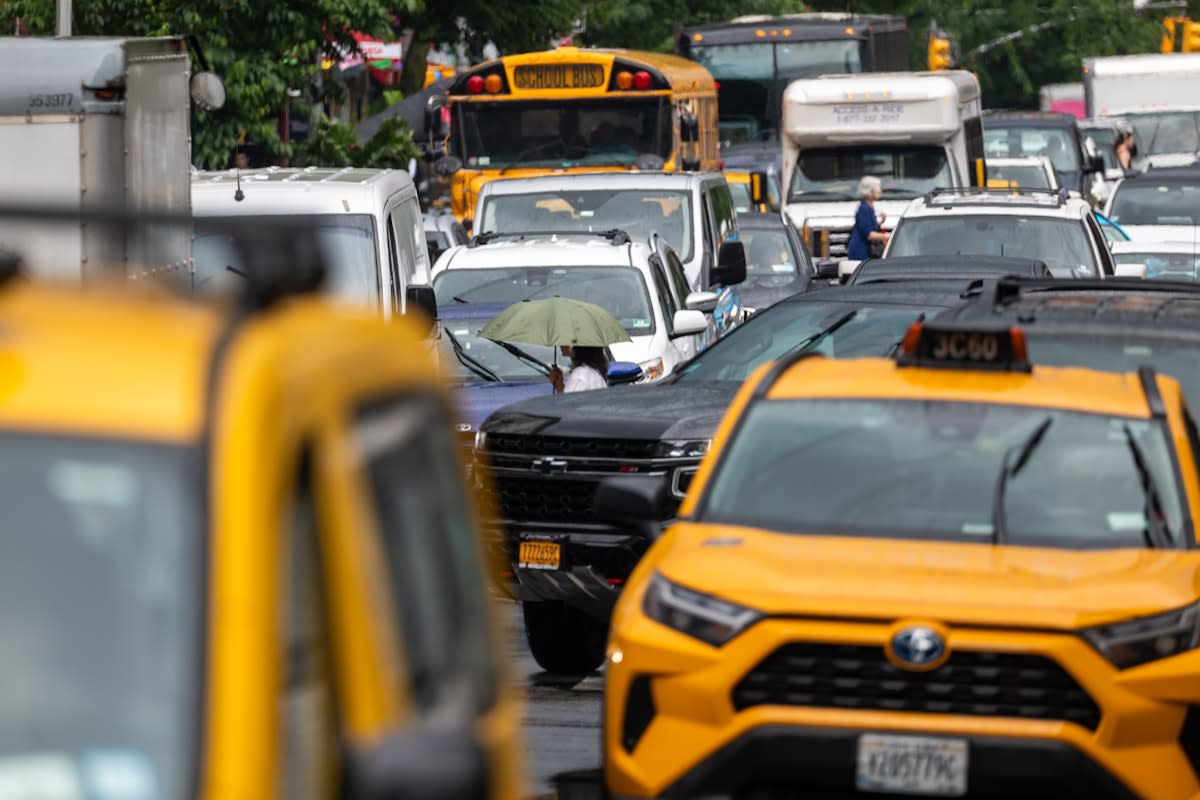Kathy Hochul Just Cost You 100 Hours of Your Life

New York City residents spend an average of 117 hours stuck in traffic each year. This is one of the problems congestion pricing—charging drivers for entering the busiest parts of Manhattan and using that projected $1 billion a year to repair and upgrade the city’s public bus and rail services—was supposed to fix, starting June 30. On Wednesday, after five years of work toward implementing the program and hundreds of millions of dollars spent, New York Governor Kathy Hochul abruptly announced that the plan would be suspended “indefinitely.”
It’s not clear whether Hochul actually has the authority to do that: The MTA—which was set to administer the program—is an independent state agency, and there seems to be ambiguity as to how it can or will respond to the governor’s decree. If the project is canceled, the state legislature—now two days from the scheduled end of session—could be sent scrambling to plug the funding hole Hochul created. Some are now wondering whether Hochul’s decision to scrap the program had anything to do with the $30,000 in campaign contributions gifted to her by car dealers, who oppose congestion pricing.
It’s a stupid decision, any way you slice it—reminiscent of the British Tories’ bizarre decision last summer to start railing against a similar scheme rolled out successfully in London a few years back. Hochul also seems fixated on wooing swing voters who either won’t vote for New York Democrats (in right-wing parts of Islands Long and Staten) or can’t (in New Jersey and Connecticut).
But the problem here isn’t just the lost benefits to public health and mass transit networks or the foreboding confirmation that even this country’s social democratic jurisdiction can’t manage to do one goddamn nice thing. It’s that if modest efforts to curtail cars can’t make it here—in a city with the country’s best public transit—it’s hard to imagine them making it anywhere else in the United States, either. For the time being, New Yorkers are poised to keep wasting hundreds of hours in cars that could be spent doing basically anything else.
The MTA equates the cost of the 117 hours per year that New Yorkers lose in traffic to “nearly $2,000 in lost productivity and wasted time.” That doesn’t quite do it justice. The tragedy of all that wasted time isn’t so much that Five Borough residents are being kept from generating surplus value for their bosses. It’s that beautiful, incalculable moments are being eaten away trying not to get rear-ended by a coked-out Goldman Sachs analyst’s Mercedes G-Class: seeing your daughter take her first steps; tender, goofy moments with your partner; reconnecting with long-lost friends.
New York City is a wondrous place, and Kathy Hochul has collectively robbed us of precious time that could be spent soaking it in. Here are just a few of the many things New Yorkers could do with all that time lost to traffic:
Be well on your way to becoming proficient in a new language
Spend 23 hours each contemplating your life, or just hanging out, in Pelham Bay Park, Prospect Park, Central Park, Astoria Park, and Ocean Breeze Park
See 45 baseball games (Go Mets)
Take advantage of public tennis courts to get good enough to strike up a Challengers-style romance with your coach or a fellow player
Undergo roughly 35 weeks of psychoanalysis
Watch the Godfather trilogy 13 times, every live-action Star Wars feature nine times, or every film in the Marvel Cinematic Universe 1.5 times
Complete 78 percent of the training required to become a Certified Public Accountant
Attend 20 raves
Cars, pitched as engines of freedom and adventure, are increasingly big, deadly machines for siphoning off time and money that could be spent elsewhere. The unfortunate reality is that way too many people rely on them to get around. That won’t change overnight, and the U.S. would need orders of magnitude more funding for public transit in order to make it a realistic option for the majority of people. Slashing America’s massive transportation-sector emissions—and making life here more pleasant—means breaking with the idea that cars let you escape the drudgery of everyday life. In reality, they add to it.


